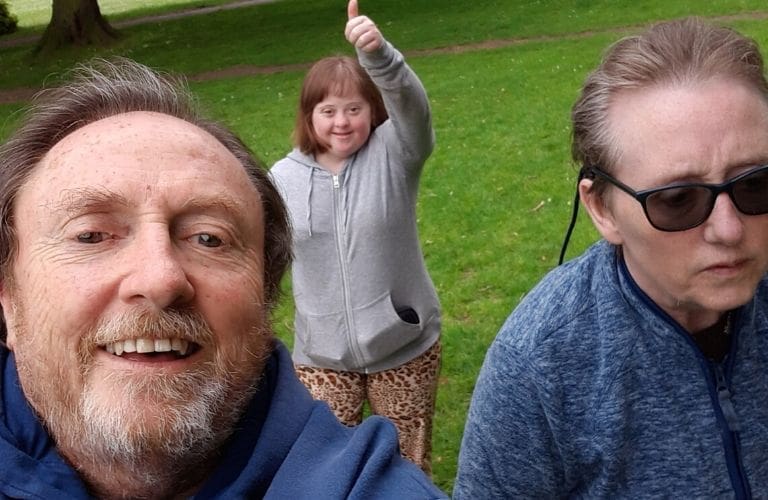
Eshaa’s story
Eshaa shares how young onset dementia impacted her father's capabilities to communicate with his friends and family.

Our specialist nurses explain the different symptoms that younger people with dementia may experience and share ideas and resources to help manage them.
Symptoms of dementia differ from person to person, depending on the type of dementia and which parts of the brain it affects.
Memory issues are one of the most recognisable symptoms of dementia and include becoming forgetful and repetitive. However, these changes may not be obvious in the early stages for younger people, and as a result, the signs of dementia may be missed or mistakenly attributed to other conditions such as stress, anxiety, depression and menopause.
More commonly, people with young onset dementia experience early changes in:
Dementia causes changes to a person’s behaviour and personality. These changes are especially common if there is damage to the frontal and temporal lobes of the brain – for example in frontotemporal dementia.
Symptoms and changes may include:
Emotional changes
Personality
Behaviour
Changes in behaviour and personality in someone with young onset dementia will increase over time, but the person may be unaware of these changes and their consequences. This can be difficult for family members, friends and colleagues to cope with – particularly children.
Difficulties with language or speech, known as aphasia, may occur in all forms of dementia.
Signs of aphasia include:
These changes are often first recognised by work colleagues, but they may attribute them to a cause other than dementia.
Communication difficulties can lead to a lack of confidence, connection and interaction with others. Speech and language therapy may help to improve a person’s speech.
Using smart phones, tablets and virtual assistant devices such as an Alexa to call or message friends and family can be useful in the early- to mid-stages of dementia. Assistive technology and apps may help the person to read and communicate.
Over time, dementia may lead to changes in a person’s movement and physical skills – particularly in Lewy body dementia and Parkinson’s. Common symptoms include:
Younger people with dementia may be physically fit and active. Activities such as walking, running, swimming, cycling or gentler exercise such as Pilates or yoga can help to maintain or improve a person’s movement by building their core strength, flexibility and balance. Physiotherapy can also be useful.
Over time, dementia will cause a general decline in a person’s social and life skills, including:
It is important that a person with dementia is helped to maintain their work and social life, carry out everyday tasks and remain independent for as long as possible. Simple adjustments sometimes make a big difference. If the person works, adjustments in the workplace can make things easier and enable them to continue to work for longer.
Changes in visual perception and spatial awareness are particularly common in some types of dementia, including posterior cortical atrophy and Lewy body dementia.
These changes are often not related to the eye itself, but to the brain’s interpretation of what the eye sees. The person may make repeated visits to the optician but find nothing wrong.
Common symptoms include:
The symptoms of dementia will change and the person’s abilities will deteriorate over time. You can prepare for the future by reading up about their particular type of dementia and being aware of possible symptoms and scenarios that may occur.
Sharing the news of the person’s dementia and the way it affects them with family members, friends, work colleagues and neighbours can help them be more understanding and offer support.
If you have been diagnosed with dementia yourself, it is natural to be fearful about how your condition will affect you in the future. Your symptoms will change and your abilities decline over time, so it is important that you are well supported.
Changes in symptoms or new symptoms are a normal part of the progression of dementia, but if you have any concerns or need support, please speak to your GP or specialist, or contact our specialist dementia nurses.
Admiral Nurse Dementia Helpline
0800 888 6678 (Monday-Friday 9am-9pm, Saturday and Sunday 9am-5pm)
helpline@dementiauk.org
Admiral Nurse virtual clinic – pre-booked appointments by phone or video call
AssistiveWare
Assistive communication products and apps
Association of Speech and Language Therapists in Independent Practice
Chartered Society of Physiotherapists
Dyscover
For people with aphasia and their families
Talking sense: living with sensory changes and dementia
tide – together in dementia everyday
Young Dementia Network
An online community of people affected by and working in the field of young onset dementia. Its resources include ID cards for people affected by young onset dementia
Our virtual clinics give you the chance to discuss any questions or concerns about dementia, including young onset dementia, with a dementia specialist Admiral Nurse by phone or video call, at a time that suits you.

Eshaa shares how young onset dementia impacted her father's capabilities to communicate with his friends and family.

John’s wife Linda was diagnosed with young onset Alzheimer’s disease at the age of 53. They have been supported by Admiral Nurse Lesley.

Tracy's husband Steve has Lewy body dementia, Tracy talks about support they've received from Admiral Nurse Liz.